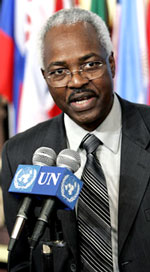- Sudan peace agreement welcomed at the UN (FCN, 05-16-2006)
- One-sided Reporting That Is Delaying An End To The Killing (UK Guardian/ZNET, 05-06-2006)
- Sudan needs help, not sanctions – A report from Darfur (FCN, 09-23-2004)

UNITED NATIONS (FinalCall.com) – The United Nations sent respected diplomat Lakhdar Brahimi to Khartoum to consult with the government of President Omar Hassan Ahmed al-Bashir on the world body to play a larger role in implementing the new peace plan. He arrived in the Sudan on May 24.
On May 16, the 15-member UN Security Council passed a unanimous resolution urging the parties in the Sudan to implement the peace accord in a speedy manner, and to allow for the deployment of a joint African Union/UN technical assessment team within a week of the passing of the resolution.
Ghana’s UN ambassador Nana Effah-Apenteng said that the assessment mission was a “key part of the peace transition.” Ghana serves as a rotating member of the Security Council.
The Sudan’s ambassador to the UN, Omar Bashir Mohamed Manis said, “My government enjoys a bright record of cooperation with the United Nations and the Security Council.”

On May 25, the UN announced through a press release that after talks with Pres. al-Bashir and several other senior Sudanese officials, that in the coming days the joint assessment mission would be accepted in the Sudan.
“I reassured my interlocutors that the intention of the United Nations was to help them and the people of Darfur successfully implement the agreement signed in Abuja, Nigeria on May 5, by using all the resources at its disposal,” Mr. Brahimi stated in the press release.
But, some pan-Africanists still want to see an African-African solution on the Sudan.
City College professor of African Studies and Political Science Dr. Leonard Jeffries continued his call for an African/African Diaspora conference on the Horn of Africa, saying it would be in the best interest of all parties.
“We must stop looking at issues state-by-state,” argues Dr. Jeffries. “This is a regional problem and we must seek solutions from that principle.”
Another issue troubling some pan-Africanists is the criticism by some editorialists in the Western media of the way the African Union has handled its mission in the Sudan, particularly in Darfur. However, not all share the opinions of the op-ed writers.
China’s Minister of Foreign Affairs, Li Zhaoxing, told the council during his May 9 speech that the signing of the Abuja agreement showed “African problems could be solved through reliance on African leadership.”
The African Union’s peacekeeping mission in the Sudan (AMIS) had come under fire recently, particularly by editorialists. An op-ed piece in the May 8 edition of the Pretoria News stated that the 7,000-man force was a “paper tiger.”
“The AU’s inability to contain the situation in Darfur has led to the spill-over of the unrest in Chad,” charged the South African editorialist.
“Pres. Bush is right to press the UN to expedite the deployment of soldiers to take over the role currently performed by an ineffectual African Union force,” stated an editorial in the May 11 edition of the New York Times.
But, UN Under Secretary-General for Humanitarian Affairs and Emergency Relief Coordinator Jan Egeland stated on May 19 that the AU mission had to be “strengthened and supported immediately.” He then explained the importance of the AU to the realities on the ground.
“A stronger and larger AMIS presence would help to establish the kind of secure environment, in which internally displaced persons would be able to return home,” Mr. Egeland stressed.
He also argued for an increased effort in raising funds to meet the humanitarian needs in Darfur, informing that there was a $389 million shortfall.
The UN World Food Program (WFP) announced on May 22 that UN Secretary-General Kofi Annan had donated $500,000 from the Zayed International Prize award he recently received.
Other donors to the WFP 2006 Sudan emergency operation: U.S. ($252.7 million); Libya ($4.5 million); Germany ($2.5 million); Norway ($1.8 million); Ireland ($1.2 million); Italy ($1.2 million); Switzerland ($757,600); Belgium ($604,000) and Luxemburg ($255,000).












